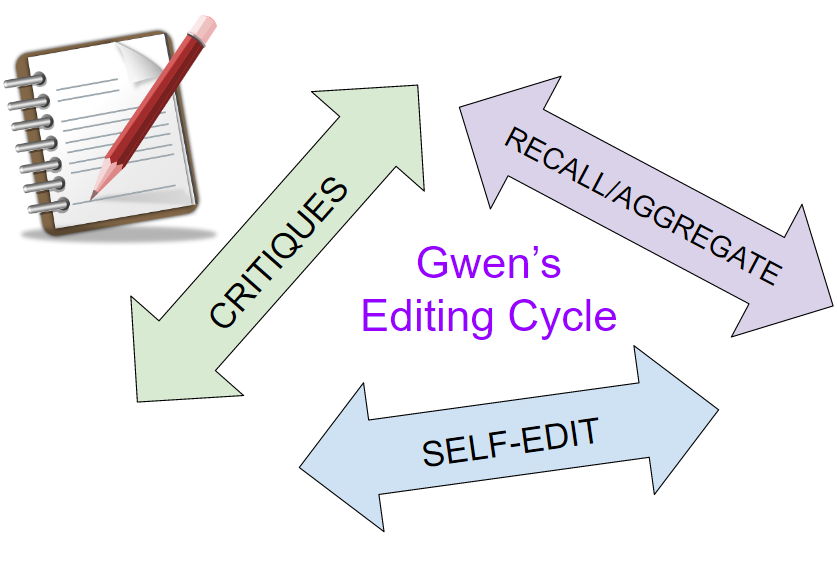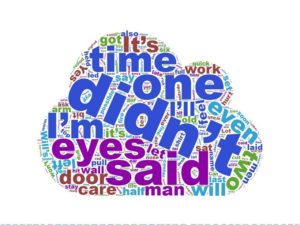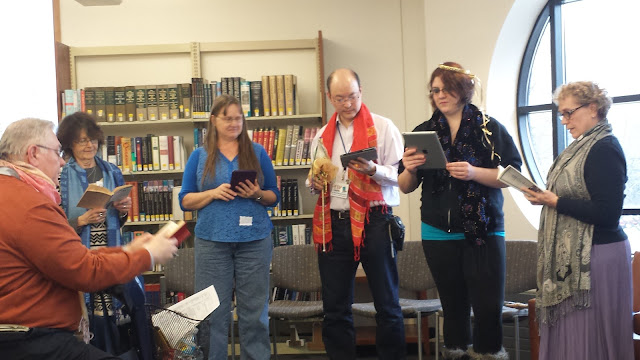For those of who you missed the meeting last weekend, I gave a workshop on how to edit a novel. The full PowerPoint presentation can be found on the Journey Drive, in the “General Meetings” folder. But, to re-cap and skip the exercises, here’s what to do with your NaNoWriMo rough draft.
(Note, the double arrows are because these often overlap)
1) Recall
Think back on your draft. What plot holes do you know you have? What needs more, or less, foreshadowing? Is there anything you need to research, be it for world, character, or plot? Do your characters stay consistent throughout the story?
Discovery Writers/Pantsers – Does your plot flow from action to action? Does it move too fast? Too slow? Did something you discover 1/2 through need to be brought to the front?
Plotters – Do your characters stay consistent? Does your world need more detail? Do you invoke the senses? Are your characters flat?
2) Self-Edit
Go through your draft and make the changes you noted when recalling it. Then, during the same pass or the next one, go through the story line by line. Keep your eye out for misspellings, especially of names or items you made up, and note your use of grammar. Fix awkward phrases, get rid of passive voice. It might help to do continuity checks too. If your hero breaks his arm in chapter 7, where is the cast in chapter 9?
A useful tool is a word cloud. Use it to determine what words you overuse, then use Word’s find feature to help you replace them.
3) Critiques
You have a front row seat to your novel, which often means you aren’t the best judge of it. Critiques help you identify trouble spots, areas that are confusing, and whether you have correct information. Give your novel to different people, other writers to identify craft issues, readers to pick apart enjoyability, or experts to make sure you covered a subject accurately.
Keep in mind, multiple crits (try to get 2-3) will give you multiple opinions.
4)Aggregate/Recall
Aggregate all the crits you received and decide which suggestions and edits you want to keep. If 3/4 readers suggest something, you should probably take a look, but if the vote is tied there are a few things you should keep in mind.
- How similar is their preference/work to yours? (A romance writer’s thoughts on how your magic system is built might not be the best advice. But listen to them about character interaction.)
- Are they familiar with the whole work, or just a chapter? (Because some things might be addressed before/later)
- What fits better with the story as you imagine it? (Do they want you to dive deeper into emotions when you want to keep it a light hearted tale?)
- How much do you trust them/their edits? (Are they actually making suggestions to be helpful, or just like to nitpick?)
It easier to answer these questions if you build a rapport with critique partners, so try to be active in a community, be it coffee shop meetups or an online forum. Take everything you’ve gotten, recall and compress it all in your head, and get ready to use that information for another self-edit.
Editing is a Cycle
How do you know when your work is ready? You never do. You should go through the cycle at least twice before querying to agents, but don’t be obsessed with making it perfect. Once you have a contract, you’ll go through all this again. But don’t let few of it not being ready hold you back!










 Human
Human